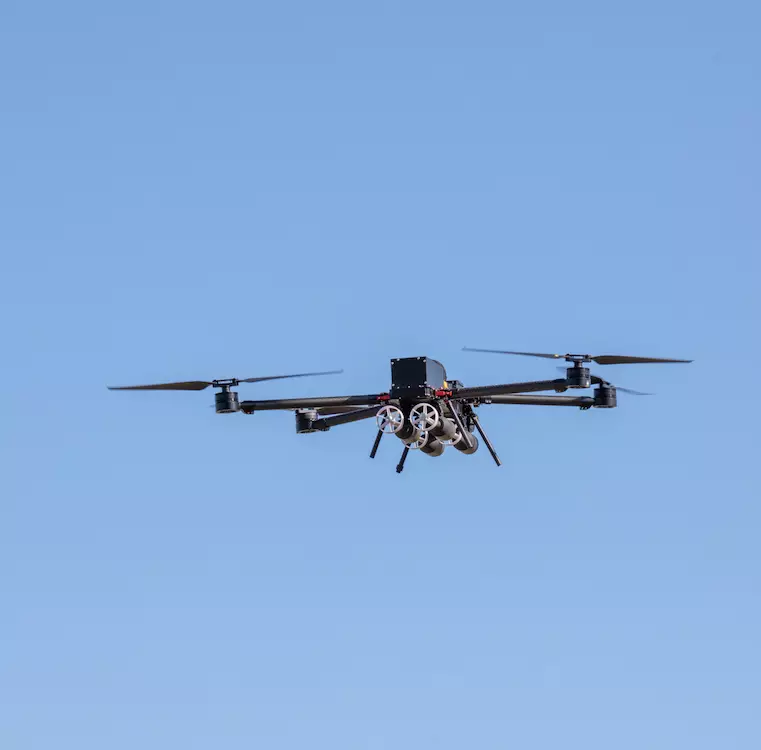The ongoing conflict in Ukraine has highlighted a rapid evolution in warfare dynamics, where traditional military strategies adapt to the urgent needs of the present. Countries involved in this modern theater of conflict are increasingly recognizing that the technologies integral to warfare now demand significantly greater financial and intellectual investment. Larger nations with expansive military budgets can afford sophisticated fleets of tanks, aircraft, and advanced weapon systems. In contrast, smaller nations, often facing existential threats, find themselves in a difficult position of needing to innovate with limited resources to effectively defend their territories.
In this tumultuous environment, defense tech startups are emerging as key players. One such company is Origin, based in Latvia, which aims to provide an innovative solution to the challenges faced by smaller states. Established in 2022 by Agris Kipurs and Ilya Nevdah, Origin is introducing reusable, autonomous drones that promise a cost-effective alternative to traditional munitions deployment methods. The founders, having previously worked on Airdog— a consumer-driven action camera drone— pivoted towards military applications in response to the shifting landscape precipitated by the war in Ukraine.
The need for innovative tools in defense has never been more critical, prompting private sector entities like Origin to rise to the occasion. By leveraging their extensive experience with autonomous systems, Kipurs and Nevdah are uniquely positioned to contribute to modern military capabilities. Specifically, their flagship product, the BEAK drone, exemplifies a new breed of ISR (Intelligence, Surveillance, and Reconnaissance) technology designed for the realities of contemporary conflict.
What sets the BEAK apart from conventional drones is its dual functionality: not only can it execute surveillance missions, but it also serves as a platform for delivering munitions with remarkable efficiency. Traditional drones deployed in combat scenarios often sacrifice themselves to strike targets, rendering them one-time-use assets. In stark contrast, the BEAK’s design allows it to deliver munitions while retaining its operational viability. This capability not only saves costs but drastically enhances tactical sustainability on the battlefield.
The terminology around the BEAK is telling. Kipurs describes it not merely as a drone, but as a “flying Javelin,” which emphasizes its role as a precision-guided weapons system rather than a standard reconnaissance craft. This classification signals a shift in mindset within military technology; the future of defense may rely on versatile tools that can both observe and engage effectively, particularly for nations with constrained military budgets.
The Appeal for Smaller Nations
The implications of Origin’s innovations reach far beyond Latvia. Kipurs argues that smaller democracies worldwide are crying out for inventive solutions to counteract aggressive powers, underscoring the need for affordable technology that can level the playing field. As the geopolitical climate shifts and alliances change, nations with limited resources must seek alternatives to traditional military procurement strategies. The ability to introduce groundbreaking technology in military operations can be a game changer for countries that previously relied on outdated systems.
Origin’s journey has not only involved significant technical development but has also garnered considerable investment interest. With €2.4 million raised in funding and additional backing from grants and governmental support, the startup appears poised for growth. The engagement from investors highlights a recognition of the tremendous potential for autonomous systems in modern warfare.
The Future of Defense Technology
As the conflict in Ukraine unfolds, it serves as a bellwether for the future of defense. Emerging technologies like autonomous drones present new paradigms for engagement, drastically altering cost calculations and operational strategies for nations of varying sizes. Origin might just be at the forefront of this shift, showcasing how innovation can emerge from necessity in the face of global threats.
The discourse surrounding military innovation underscores a crucial point: adaptation and agility are no longer optional but a prerequisite in the domain of national defense. As talent converges on the intersection of technology and security, the future of warfare may well rest in the hands of those who can think creatively within the constraints of resource scarcity. As we look to the future, the evolution of defense entrepreneurship like Origin may become integral to safeguarding sovereignty in an increasingly unpredictable world.

